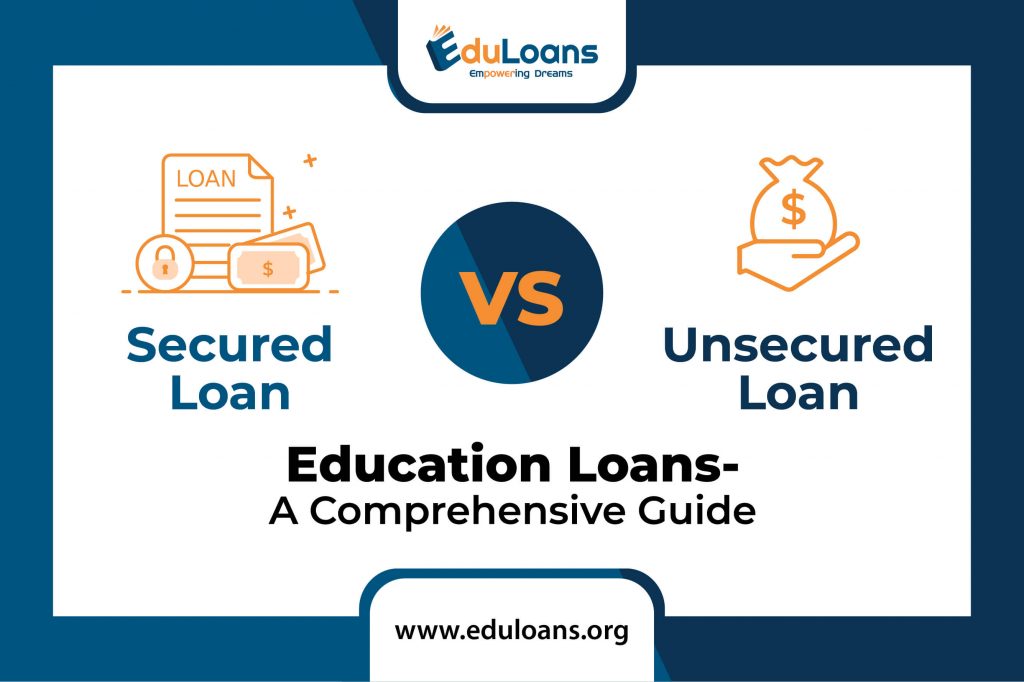
Overseas education loan can be of two kinds- secured and unsecured. These are also called loans with, and without collateral, respectively. The difference between these two kinds of education loan to study abroad is only whether or not you pledge your collateral or submit a guarantee or not. Both these kinds of education loans are available for students who need to borrow finances from banks or NBFCs. Albeit, these are the kinds of education loans, yet the more popular ones are secured overseas education loan because of higher amount that is available to you and more benefits. This blog is a complete and comprehensive guide to the kinds of loans mentioned here.
Secured education loan to study abroad
This is the kind of overseas education loan which is covered by guarantee or collateral, which is tangible.
Unsecured education loan to study abroad
This is also called Non-Secured Loan. It is called so because it is not secure for the bank since the borrower is not pledging anything tangible against the loan amount and intangible security like personal guarantees is provided. It is not covered by any kind of collateral, which is why, it is a huge risk for the bank and comes with forfeiting disadvantages for the bank. For a borrower, it may be advantageous, but secured loans offer much more benefits than this one.
What kinds of collaterals can a borrower pledge?
Education loan to study abroad with collateral is a popular option since it can offer you a larger amount for loan and comes with several other advantages. A borrower is often in doubt regarding the kinds of collaterals they can guarantee. The table below helps you know if or not, your belonging falls under the category of a collateral.
| Loan against property | Loan against deposits | Loan against securities | Loan against third-party guarantee |
| Agricultural Land/flat/house | Fixed deposits | Equity shares | Certificate of guarantee from a borrower’s home bank |
| Non-agricultural land/flat/house | Recurring deposits | Debentures | Certificate of guaranteeprovided by employer of a borrower |
| – | Gold deposits | Bonds | – |
Unsecured Loan- Without Collateral: A complete guide table
| Features | Public Sector Banks | Private Banks | NBFCs |
| Example of the Lenders | SBI, BOB | Axis Bank, ICICI Bank | Avanse, Incred, Auxilo, Credila |
| Loan Amount (INR) | Check with each bank for loan amount. | Upto INR 40 lakhs | Upto INR 25 lakhs |
| Interest Rate Range | 11.5%-13.5% | 12%-16% | |
| Processing Fees (INR) | Check with the bank for latest figures or get in touch with Eduloans. | 1%-2% loan amount | |
| Number of Colleges Supported | Listed in bank’s annexure | Listed in bank’s annexure |
Secured loan- with collateral: A complete guide table
| Features | Public Banks | Private Banks | NBFCs |
| Example of the Lenders | SBI, BOB | Axis Bank, ICICI Bank | Avanse, Incred, Auxilo, Credila |
| Loan Amount (INR) | Upto INR 1.5Cr | Upto INR 60 lakhs | Upto INR 60 lakhs |
| Interest Rate Range | 9.2%-10.5% | 11.5%-13.5% | 12%-14.5% |
| Processing Fees (INR) | INR 11800 | INR 0 for less than INR 20 lakhs loan amount and, INR 750 on each lakh above INR 20 lakhs. | 1%-2% loan amount |
| Repayment while studying | None | Simple Interest | Simple Interest |
Education loan to study abroad: What to choose?
Here are a few suggestions from Eduloans, considering all possibilities at hand-
In case you aren’t able to guarantee any collateral, you must choose a private sector bank or NBFCs. Here, a private bank will charge a lower interest rate than an NBFC. Additionally, you may also get tax rebates from a private bank, while also having a lower processing fee.
Otherwise, a public sector bank is the best option for a secured overseas education loan if you are willing to pledge a guarantee. Eduloans loan counsellor provides you a comprehensive information and the best option for you, depending upon your profile and requirements.